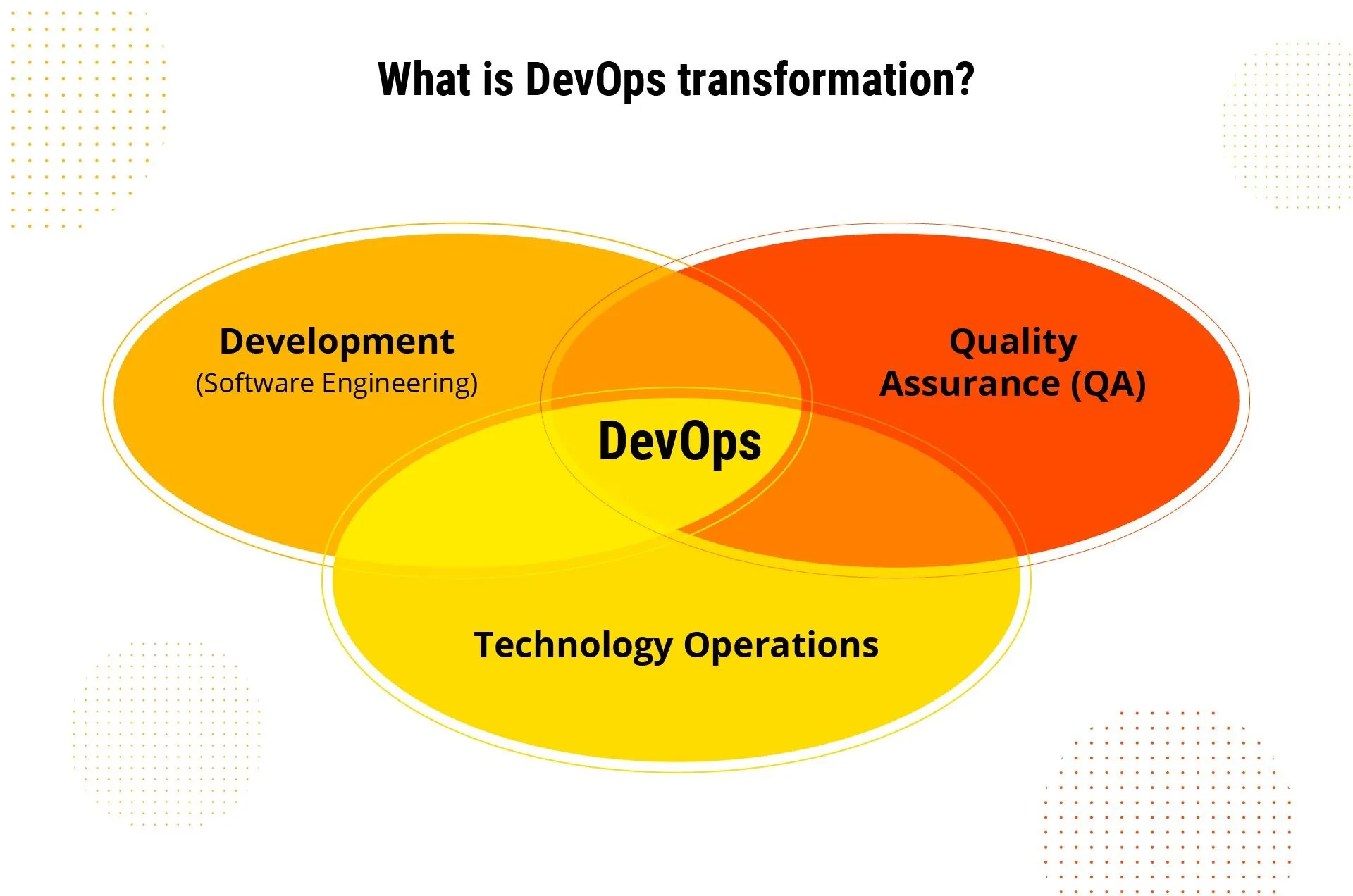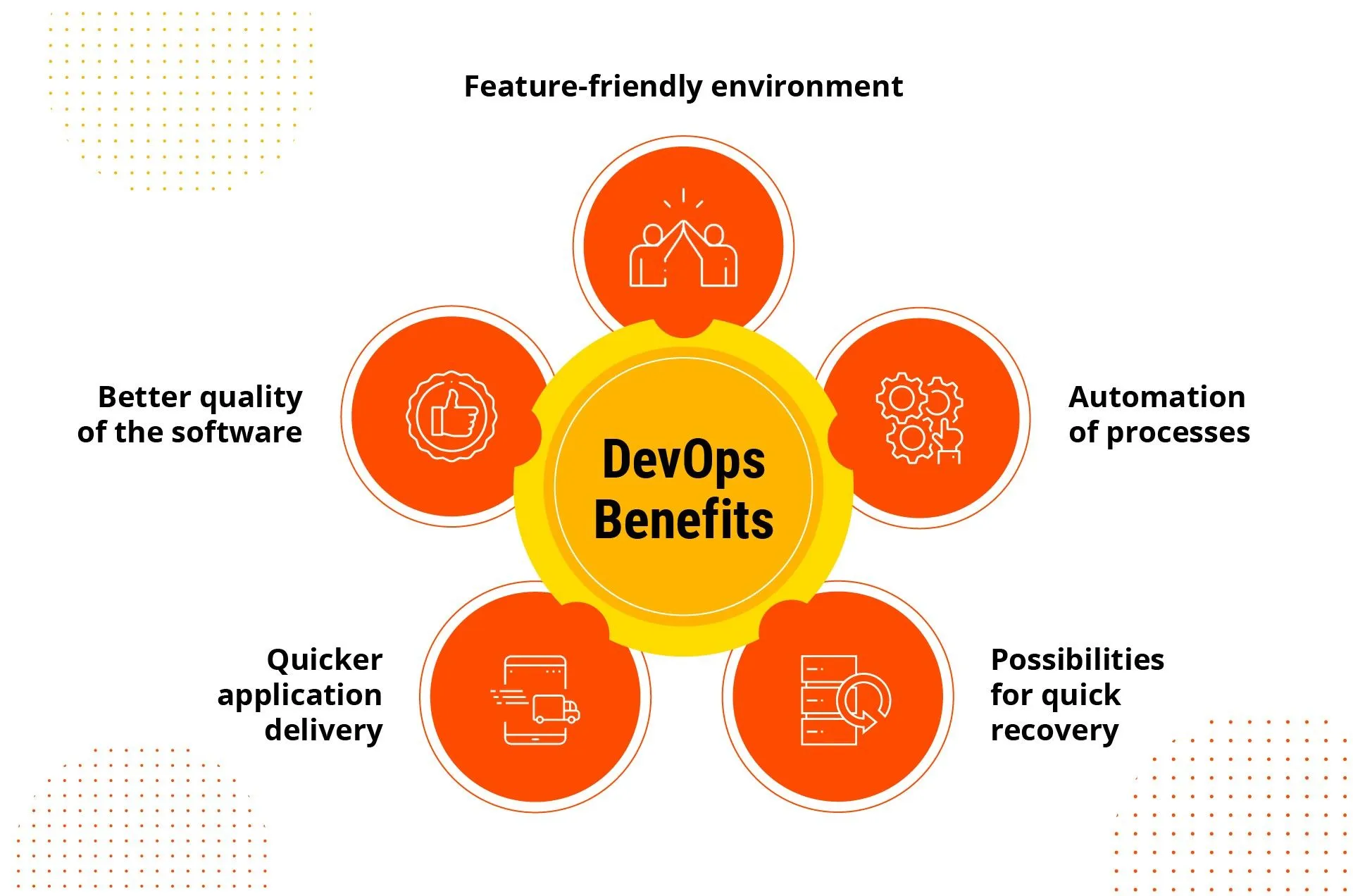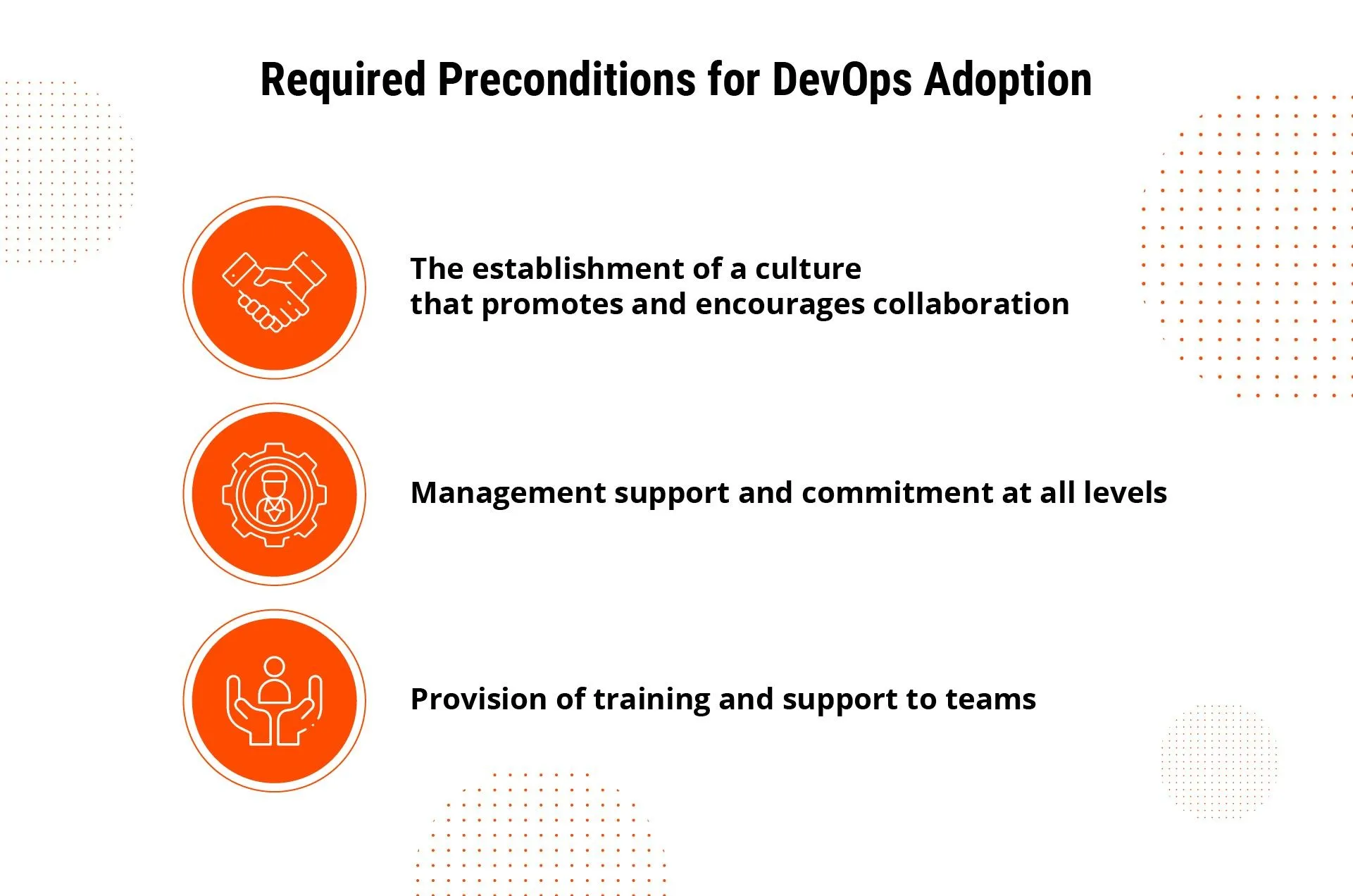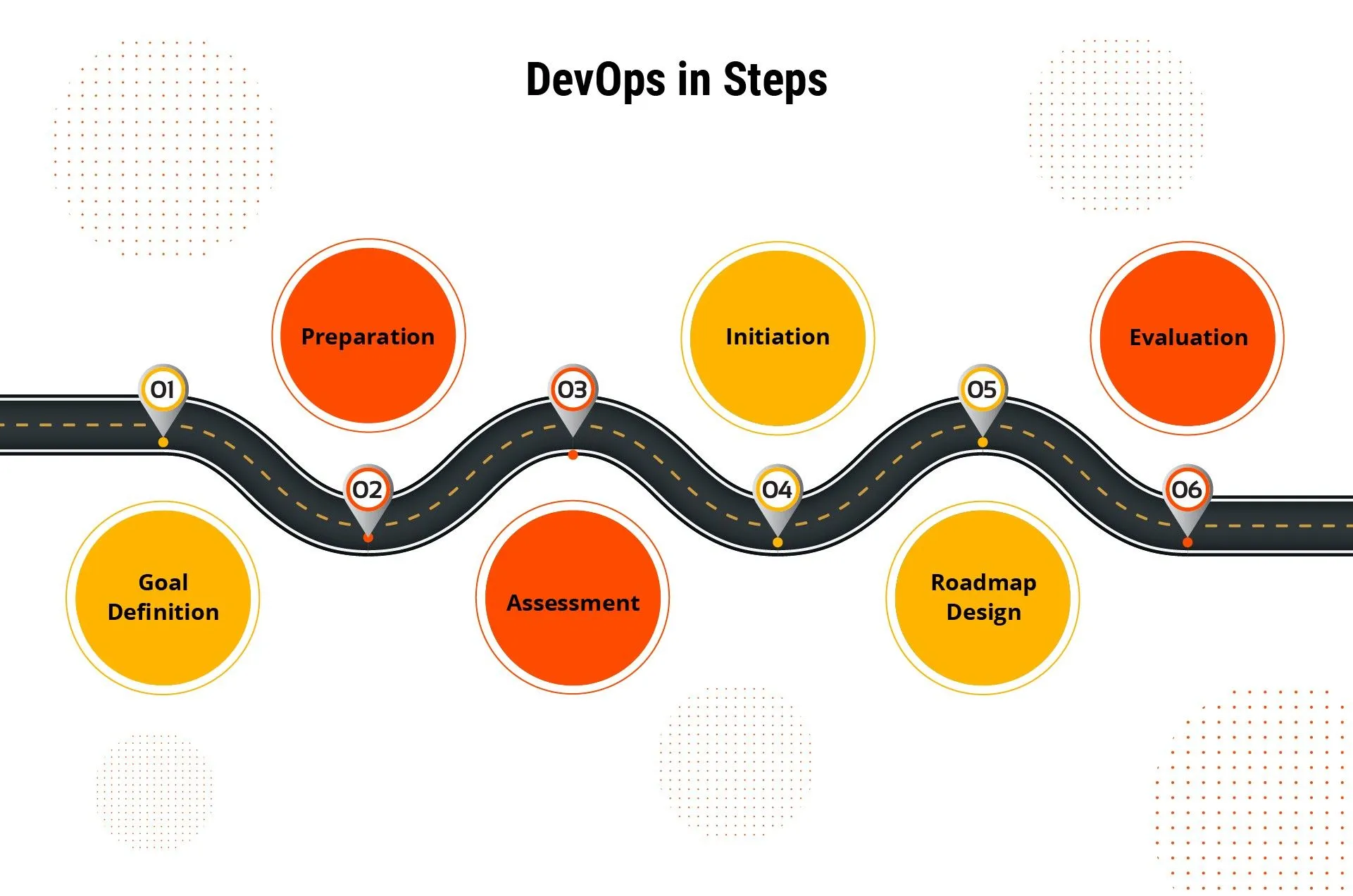DevOps Transformation: Why and When Do You Need It?
Table of contents
- What Is DevOps Transformation?
- Role of DevOps in Digital Transformation
- Better quality of software
- Quicker application delivery
- Possibilities for quick recovery
- Feature-friendly environment
- Automation of processes
- What Is Important for a Successful DevOps Transition?
- DevOps Transformation Plan by Emerline
- Goal definition
- Assessment
- Roadmap design
- Preparation
- Initiation
- Evaluation
Living in a time when the digitization of services is no longer considered as a means of getting a competitive advantage but a necessity, businesses are constantly looking for new ways to enhance their strategies and create a sharper competitive edge. And there are plenty of options available, starting from the implementation of certain innovations to the reconsideration of the overall IT model. The latter is directly related to the DevOps practices that offer businesses a large number of benefits, including a faster delivery time to market, higher customer satisfaction, higher revenue, and better profit growth.
So what is DevOps, how does this practice contribute to efficient digital transformation, how to implement one, and what stages of DevOps transformation to consider? Let’s answer these questions one by one.
What Is DevOps Transformation?
DevOps practice is aimed at the establishment of close cooperation between the aspects that influence the speed and quality of software delivery. These incude:

Still, DevOps is much more than that. It covers not just technical, but also cultural and commercial aspects of an IT organization, in this way improving business agility and creating an ideal environment for mutual collaboration, communication, and integration across teams operating at different facilities and parts of the world. Considering all these, there is no wonder why 25% of Global 2000 organizations take advantage of DevOps that opens up opportunities for continuous integration and continuous delivery, automated testing, proactive monitoring, and automated configuration management.
Role of DevOps in Digital Transformation
The rapid advance of technologies offers a variety of ways for a company to undergo digital transformation. So why pay attention to DevOps as the core element? To answer this question, let’s take a look at the key benefits of DevOps to business.

Better quality of software
It’s no secret that collaborative work works miracles to the final results. It is so because it ensures an information and knowledge sharing environment, and exactly such an environment is created by DevOps. By making development and operations work in close collaboration, this practice allows bringing together such development elements as features, performance, and reusability and operation-related issues such as deployability and maintainability. In this way, DevOps works to enhance the overall code quality and create an environment or improved testing, both resulting in the delivery of a quality product.
Quicker application delivery
Because the DevOps practice is created in a way to synchronize the work of two teams, dev- and ops-specialists, it eliminates misunderstandings between them and creates a unified environment for issues related to infrastructure, configuration, deployment, log management, and performance monitoring. As a result, there are no slow-downs in processes, and companies can enjoy accelerated application delivery.
Possibilities for quick recovery
Unfortunately, IT failures are still common, especially in situations when a company decides to enhance software by releasing hundreds of updates at once. This can result in a real disaster and require to code and deploy from scratch. For sure, such situations negatively affect a business, sometimes making customers question its reputation. And here is where DevOps can help, significantly shortening recovery time thanks to the ongoing development approach that allows possibilities of changes in case of IT failures.
Feature-friendly environment
When it comes to traditional practices of software development, the health of the system is under the responsibility of operation specialists, while new features are under the development team. Quite often, when some new features need to be released, such a division in responsibilities leads to a conflict. But with DevOps, where both development and operation specialists work as one team, there is always a space for the new feature implementation in a stable environment, created to allow quickly responding to negative application changes and maintaining a healthy system operation.
Automation of processes
With DevOps practice in place and possibilities for automated backups and rollovers, companies can enjoy the opportunity of automating such repetitive tasks, solely relying on the DevOps team. In addition to automation, there is one more benefit that derives from it — monetary savings.
What Is Important for a Successful DevOps Transition?
So how does it happen that despite all of the above-mentioned benefits, many organizations are still struggling to adopt DevOps? It is so because this practice is not just about obtaining new skills and working patterns but a shift in mindset and behavior as well. So here are some preconditions that companies have to meet to ensure successful DevOps adoption:

For sure, when it comes to DevOps outsourcing services, things become simpler as there is no need to reinforce the need for training and find in-house professionals who are familiar with agile methods and have experience with DevOps.
DevOps Transformation Plan by Emerline
When looking for a DevOps provider, it’s not just experience that becomes one of the crucial selection criteria. One more important element to pay attention to is a DevOps strategy offered by a company of interest.
Even though there could be some distinctions in the delivery process — those dictated by the individual needs and expectations of a company requesting DevOps services, and a more comprehensive roadmap is developed individually for each client, below we provide you with a list of keystones of DevOps delivery process that we adhere at Emerline.

Goal definition
The very first thing to do is to think about the desired destination point. Together with our consultant specialists, we clearly define business transformation objectives, so both sides can know exactly in which direction to go.
Assessment
Starting from the evaluation of the current processes and implemented practices within your company, and continuing with other derivatives that impact your employees’ mindset, we analyze your company as a unified organism, in this way ensuring the creation of a roadmap that would offer benefits to each structural element.
Roadmap design
Keeping in mind the current state and the desired destination point, we create a roadmap that ensures the successful outcome of DevOps adoption to your business.
Preparation
Because DevOps implementation implies close collaboration over monitoring, we will work to build a friendly environment that would promote the success of our cooperation. If there is a need, we will provide your company with DevOps coaches, in this way ensuring positive change in your employees’ mindset, organizational culture, and processes.
Initiation
DevOps is continuous, so when it comes to the initiation, we take advantage of this characteristic to make the implementation of this practice smooth and pain-free. Furthermore, we ensure a great level of transparency, when designing new processes or customizing the existing ones, in this way contributing to trusting and fruitful relationships.
Evaluation
It’s not just about the evaluation of the overall progress (KPIs) but also a review of every stage of the shared journey. Paying attention to each element that impacts the overall success, we ensure that all processes, whether it is load time, cycle time, recovery time, or deployment frequency, are under continuous improvement.
Keeping a finger on the pulse of the latest DevOps tendencies, we ensure the ability for our client to take advantage of the best practices that lead to desired outcomes, whether it’s about faster delivery, improved collaboration and communication, more satisfying user experiences, higher product quality, faster time to market, etc. If DevOps is something that your company lacks for undergoing a successful digital transformation, contact us, and our specialists will provide you with a comprehensive consultation. So you can create a picture of how we walk this road together and decide if our collaboration would be beneficial for your business.
Published on Nov 8, 2022





